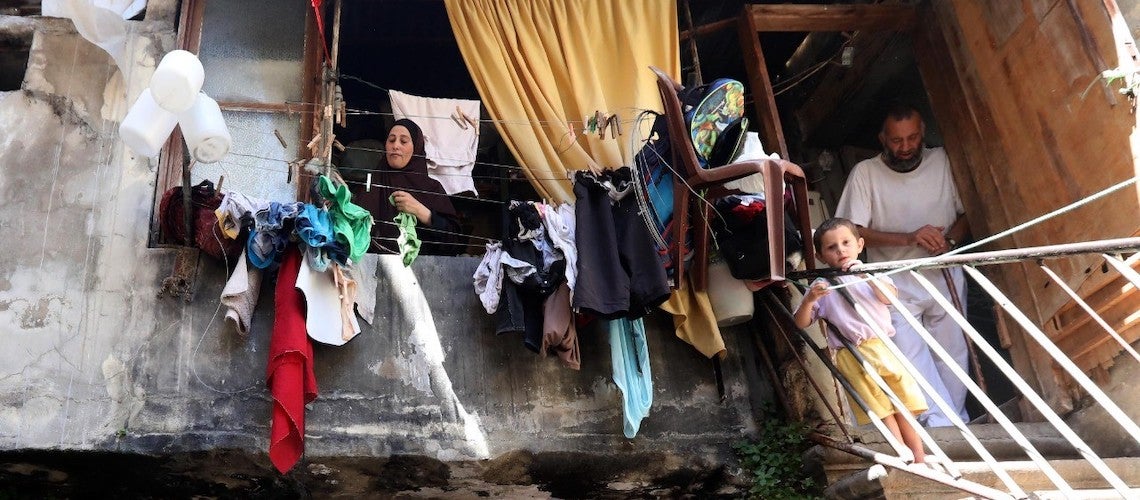 MPI
MPI
Children in Lebanon under 18 years of age bear the greatest burden of multidimensional poverty. This is one of the main findings from the newly launched 2019 Lebanon Multidimensional Poverty Index (MPI) prepared by the Central Administration for Statistics (CAS) with technical support from the World Bank and co-funding from the Dutch Ministry of Foreign Affairs under the PROSPECTS Program. The youngest cohort experienced the highest incidence of multidimensional poverty in 2019, with nearly two-thirds of children between the ages of 0 and 4 years found to be deprived. Unfortunately, the situation in the country reflects a global phenomenon where over 50% of the multidimensionally poor globally, are children.
Figure 1: Incidence of multidimensional poverty by age group, 2019

Source: Authors’ calculation using data from LFHLCS 2018-2019
Note: The error bands are for 95% confidence intervals.
The MPI for Lebanon was constructed using the nationally representative Labor Force and Household Living Conditions Survey of 2018-2019. The index is derived from 19 indicators across five dimensions: education, health, financial security, basic infrastructure and living standards.
The 2019 MPI for Lebanon reveals that 53.1% of all the residents in Lebanon were multidimensionally poor as they were deprived in over 25% of the indicators. The extreme poor, where residents are deprived in more than 50% of the indicators, amount to 16.2% of the population. The largest contributors to national MPI-poverty are deprivations in health insurance (24.8%), followed by school attainment (18.3%) and further along by low-security work (9.7%). When aggregating by dimensions, the largest contributor to deprivation is the health dimension (30.2%), followed by employment (25.8%) and education (25.3%). The living standards and basic infrastructure dimensions contributed 13% and 6% respectively.
Female-headed households were also found to be relatively poorer in multidimensional terms (at 56.7%) relative to their male counterparts (at 52.6%). Approximately, 11.6% of individuals live in female-headed households while the rest (88.4%) reside in male-headed households.
Across the eight governorates, Akkar and Bekaa are the poorest, while the greatest intensity of poverty among the MPI-poor is experienced in Beirut. In other words, while one is less likely to be MPI-poor in Beirut, the poor in Beirut are more likely to experience greater deprivation than in other governorates. Approximately a third of Lebanon’s MPI-poor reside in Mount Lebanon where about 41% of the population reside. The composition of the multidimensional poverty is fairly similar across the governorates. The largest share – corresponding to the absence of health insurance – contributes anywhere from 23% to 27.4% to overall poverty.
Figure 2: Contribution share of each indicator to governorate-level MPI, 2019
Source: Authors’ calculation using data from LFHLCS 2018-2019
In the MENA region, Lebanon now joins nine other non-high-income countries (HICs) for which MPI statistics have been produced in the past decade. The addition of Lebanon favorably raises the coverage of developing countries in the MENA region with recent MPI statistics to nearly 77%, which now ranks the second highest coverage-wise after the South Asia region.
The 2018-2019 data used in constructing the new MPI predates the start of Lebanon’s current economic and financial crisis and does not take into account the impact of the subsequent developments namely the COVID-19 pandemic and the Port of Beirut explosion on people’s welfare. Looking ahead, the 2019 MPI will form a baseline against which future MPIs can be compared, as new data are generated on the evolving conditions of individuals and households in the country.
The full MPI report, brief and slides can be found here.




Join the Conversation